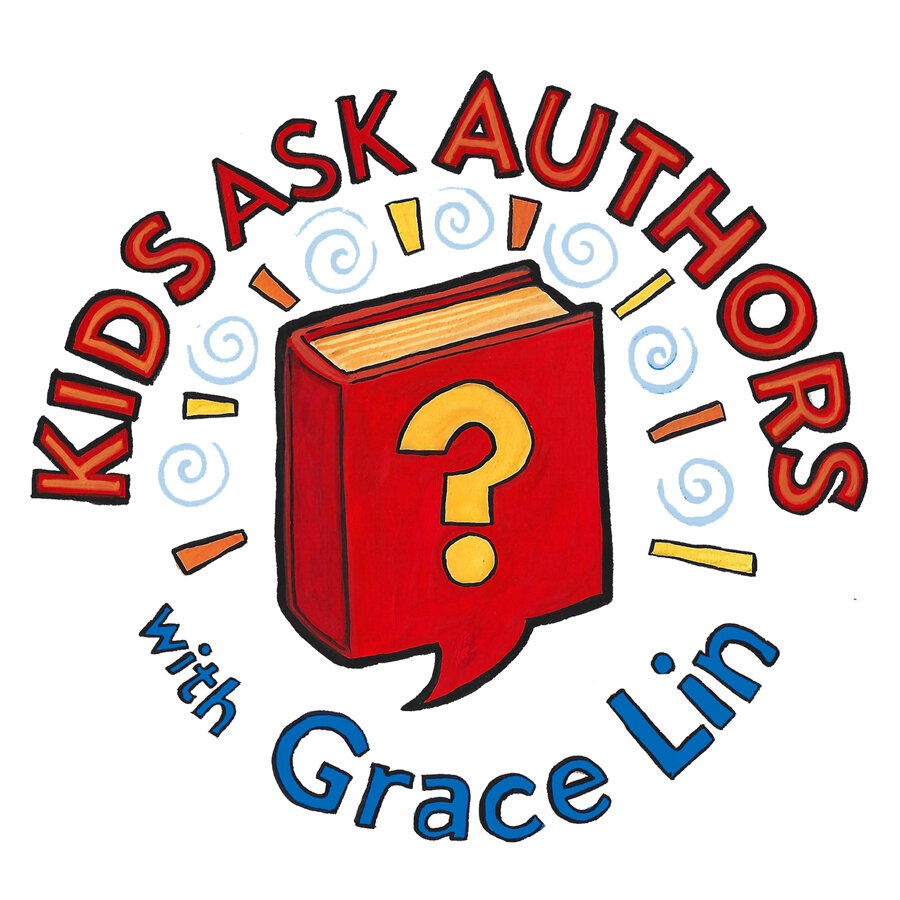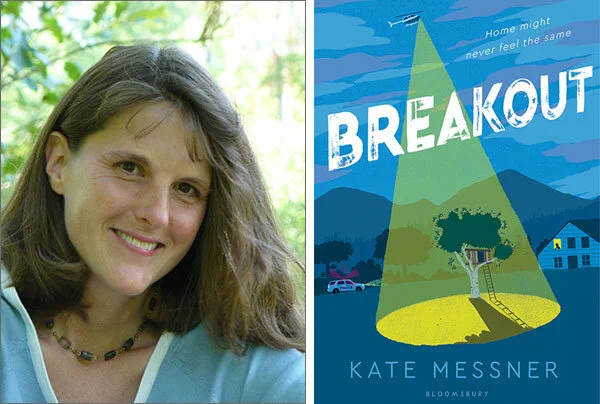Who Helps You With Your Writing? -With Kate Messner
Welcome back to another great episode of Kids Ask Authors! Grace Lin and Kate Messner answer the kid question, “Who helps you with your writing?”
TRANSCRIPTS:
Grace Lin: Hello. I'm Grace Lin, children's book author and illustrator of many books, including the middle-grade novel, Where the Mountain Meets the Moon and the picture book, A Big Mooncake for Little Star. Today, I'm here with Kate Messner, author of the Ranger in Time series, as well as the middle-grade novel, Chirp, and the picture book, the Next President, illustrated by Adam Rex. Hi, Kate.
Kate Messner: Hi, Grace.
Grace Lin: So thank you for coming today. Are you ready for today's question?
Kate Messner: I am. I'm so excited to be here.
Grace Lin: All right. Today's question is from a person named Jack, and Jack asks-
Jack: Who helps with your writing?
Grace Lin: Who helps you with your writing?
Kate Messner: What a great question. I love that Jack already knows that nobody really writes all alone, right? Because we're all influenced by the amazing things we read and the people we talk to.
Kate Messner: So I have a long answer to that question. For starters, I do a lot of research for my writing. Like with Chirp, which is a mystery set on a cricket farm, I spent time on real cricket farms talking with cricket farmers, which are a thing. I always talk with people to get information about the settings I'm writing about and if there's some particular expertise that a character in the book has that I don't have, I'll talk to people who know more about that topic. So those people help with my writing. But when it comes down to the actual story and the craft of writing, I mostly rely on other writers for help.
Kate Messner: So I have several great writer friends with whom I will swap manuscripts sometimes, and this is really similar to what happens in school. Maybe you've done a piece of writing and you trade papers with a friend to get ideas for how to make it better, authors do that too. We call our friends, critique partners. So I will often finish a manuscript and send it to my friend, Linda Urban, who's also a middle-grade author. She's written books like A Crooked Kind of Perfect, and the Center of Everything, and Weekends with Max and his Dad, Road Trip with Max and his Mom. We will trade manuscripts and read for one another and then make comments on the other person's manuscripts, so we'll do things like point out what works really well, say, "Wow, I love this scene. It made me laugh so much because this line especially was really funny", or "I love how vividly you described this one setting." And then we'll also ask questions if there's something we don't quite understand like, "I wasn't sure what you meant by this", or "I was kind of surprised that that character acted that way and I wondered what the thinking behind that was." So we'll ask questions designed to get the other person thinking about our writing. And I have several other pals that I'll trade manuscripts with to do that as well. It's a huge help to get somebody else's eyes on your story.
Grace Lin: That's really great. I think I have a lot of helpers too. And I agree, I think it's great that Jack knows that nobody really writes a story all by themselves, even though there's only usually one name on the cover.
Grace Lin: So I have a lot of helpers too. When I'm thinking of stories or writing the first draft, usually I ask my daughter sometimes, it depends on the book, but sometimes I'll... Like right now I'm writing these silly duck stories, and I'll be like, "So what do you think the duck's name would be?" Or "What do you think ducks like to eat?" Things like that, and that's always fun.
Grace Lin: And then I have other friends that I just, after I'm finished with the first draft, I'll send to them just to see if the story works. "Does it make sense to you as much as it does to me?" But my biggest helper I would say is probably my editor. I would say my editor, who I send the story and after I'm sure it makes sense, after I think I've gotten it pretty good, I send it to my editor, Alvina Ling, and she is the one who really, really helps me get it to a place where it's ready for readers to read. I feel like the editor's like how for Jack, maybe your teacher is for you. So my editor is like a teacher, they make sure that everything holds together, they fix some awkward writing, they help you push your writing to a better place so it makes more sense and more funny or more interesting. So I think that for me, my biggest helper is probably my editor.
Kate Messner: I would agree with that. I was thinking of earlier in the writing process, we do so many different drafts as authors that I usually get help from a whole bunch of people before I send the book to my editor. But then same situation, you can't really write a successful book without the help of an editor. I've made that same comparison that an editor is a lot like a teacher. And I think the feelings that kids have when they get a paper back that's marked up with questions and suggestions for how to make it better, and you see it and you're like, whoa, that can feel overwhelming sometimes. Authors feel that way too. And for me, one of the things that helps is to take that list of suggestions and all of those marks on the manuscript, and turn it into a smaller to do list so that I can tackle one job at a time.
Grace Lin: That's true. I'm sure when students get their papers back with all these red marks, they must feel so upset and angry because that's how I often feel when I get my manuscript back with all these red marks, a little bit annoyed, a little bit angry because like, "Wait, what do you mean all this is wrong? I worked so hard", but it takes me a while. It takes me like a week and then I realize, "No, my editor's not trying to just hurt my feelings or tell me anything. My editor likes my work and she's just trying to make it better." I think that's something that students can remember with their teachers too, they're not just trying to make you feel bad, they're just trying to make your work better.
Kate Messner: Right. And now when I get one of those letters with all the suggestions, I actually get really excited because this book that I thought was the best book I could possibly make it now has the possibility to be even better. I have all these new ideas and new strategies to try.
Grace Lin: That's true. I agree with that, but I don't really get excited when I see it. It usually takes me maybe a week to just be like, "Okay, let me think about it" because my first reaction is like, "Aw, I thought it was good." And it was good, but it just means it could be better. So thank you so much, Kate, for answering this question and thank you so much, Jack, for asking it.
Kate Messner: Thanks a lot, Grace and Jack. It was great to chat today.
Grace Lin: Bye.
Kate Messner: Bye-bye.
Today’s BOOK REVIEW comes from John Henry! He’s reviewing “The Bookwanderers” by Anna James and Paola Escobar.
The Bookwanderers. Author: Anna James. Book type: Fiction slash Adventure.
What is this book about? This book is about Tilly Pages, whose mom ran away, and Tilly and her friend Oskar's quest to find her. On top of that, Tilly finds out that her and her grandparents are bookwanderers, and that they can travel into books.
Would you recommend this book to someone else? Why? I recommend this book to people who love fantasy, fiction, adventure and cozy books.
Thank you so much John Henry!
More about today’s authors:
Kate Messner is passionately curious and writes books that encourage kids to wonder, too. Her titles include award-winning picture books like Over and Under the Pond, Up in the Garden and Down in the Dirt, Over and Under the Snow, The Brilliant Deep, and How to Read a Story; novels that tackle real-world issues like Breakout, All the Answers, and The Seventh Wish; mysteries and thrillers like Capture the Flag, Eye of the Storm, and Wake Up Missing; the Fergus and Zeke easy reader series; and the popular Ranger in Time chapter book series about a time-traveling search and rescue dog.
Kate’s titles are frequently selected for One School, One Book and One School/One Author programs and other community-wide reads – especially The Seventh Wish, which deals with a family affected by heroin addiction, and Breakout, a novel inspired by a real-world prison break, which takes a look at privilege and perspective.
Before becoming a full-time writer, Kate was a TV news reporter as well as an educator who spent fifteen years teaching middle school English. She lives on Lake Champlain with her family and is trying to summit all 46 Adirondack High Peaks in between book deadlines.
Grace Lin, a NY Times bestselling author/ illustrator, won the Newbery Honor for Where the Mountain Meets the Moon and her picture book, A Big Mooncake for Little Star, was awarded the Caldecott Honor. Grace is an occasional commentator for New England Public Radio , a video essayist for PBS NewsHour (here & here), and the speaker of the popular TEDx talk, The Windows and Mirrors of Your Child’s Bookshelf. She is the co-host of the podcast Book Friends Forever, a kidlit podcast about friendship and publishing (geared for adults). Find her facebook, instagram , twitter ( @pacylin) or sign up for her author newsletter HERE.
Special thanks to the High Five Books & Art Always Bookstore, Ms. Carleton’s 2nd grade class at Jackson Street School for their help with our kid questions and reviews.






